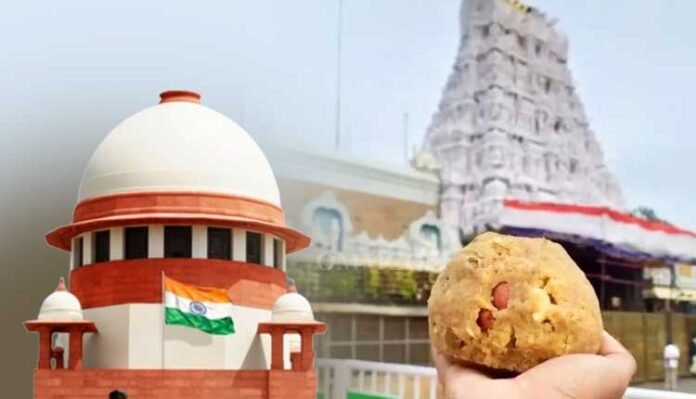New Delhi: In a significant development concerning the controversial Tirupati Prasadam distribution row, the Supreme Court of India has ordered an independent investigation by a Special Investigation Team (SIT) under the supervision of the Central Bureau of Investigation (CBI). This ruling comes in response to mounting allegations of mismanagement and corruption in the distribution of the revered prasadam, a sacred offering of food from the Tirumala Tirupati Devasthanams (TTD), which manages the Tirupati temple, one of the richest and most visited pilgrimage sites in the world.
Background of the Controversy
The controversy surrounding the Tirupati Prasadam began when allegations surfaced regarding irregularities in the distribution process. Reports claimed that the prasadam, which is traditionally considered a divine blessing by devotees, was being sold illegally in various markets. Concerns were raised about the quality of prasadam being distributed, with some instances reporting that substandard offerings were being served to devotees.
These allegations ignited public outrage, particularly among devotees who view prasadam as a sacred offering from Lord Venkateswara. The issue escalated when whistleblowers from within the TTD came forward, alleging that the temple administration had been involved in corrupt practices, including the diversion of funds and manipulation of the distribution process.
Supreme Court Intervention
The Supreme Court’s decision to order an SIT investigation marks a crucial step in addressing these allegations. The bench, led by Chief Justice D.Y. Chandrachud, emphasized the need for transparency and accountability in the management of temple resources. The court’s ruling mandates that the SIT, consisting of experienced officers, will conduct a thorough investigation into the allegations, ensuring that the inquiry is free from any political or administrative influence.
In its order, the Supreme Court also highlighted the importance of maintaining the sanctity of the prasadam and the trust that devotees place in the temple administration. The court directed the SIT to submit regular progress reports to ensure that the investigation is conducted promptly and efficiently.
Public Reaction
The Supreme Court’s ruling has been welcomed by various stakeholders, including devotees, social activists, and political leaders. Many see it as a necessary measure to restore faith in the management of one of India’s most revered temples. Activists have long argued for greater oversight of temple administrations, especially in light of the significant revenues generated from offerings and donations.
Devotees have expressed their hope that the investigation will bring to light the truth behind the allegations and lead to accountability for those responsible for any mismanagement. The sentiment among the public is one of cautious optimism, with many looking forward to seeing the outcome of the investigation and the subsequent actions taken by the authorities.
Implications for Temple Governance
The Tirupati Prasadam row has broader implications for the governance of religious institutions in India. With temples often being major revenue-generating entities, questions surrounding their administration and accountability are becoming increasingly prominent. The Supreme Court’s intervention serves as a reminder that transparency is essential in maintaining the trust of devotees.
As the SIT prepares to begin its investigation, it will likely examine various aspects of the prasadam distribution process, including the procurement of ingredients, preparation methods, and distribution mechanisms. The inquiry could potentially reveal systemic issues within the TTD and may lead to reforms aimed at improving governance and operational standards.
Future Outlook
The SIT investigation is expected to take some time, but it has the potential to reshape the future of temple administration in India. Depending on the findings, the inquiry could lead to significant changes in how temples manage their resources and engage with their communities. The Supreme Court’s emphasis on accountability may also encourage other religious institutions to adopt more transparent practices.
Furthermore, the ruling may set a precedent for handling similar allegations of mismanagement in other temples across the country. As the SIT embarks on its investigation, all eyes will be on the outcome, with many hoping for a resolution that honors the trust and faith of millions of devotees.
The Supreme Court’s order for an independent SIT investigation into the Tirupati Prasadam row is a landmark decision that underscores the importance of transparency and accountability in the management of religious institutions. As the SIT begins its work under the supervision of the CBI, the anticipation for justice and reform grows among devotees and stakeholders alike. This development not only aims to address the immediate concerns surrounding prasadam distribution but also serves as a pivotal moment in the broader conversation about governance in religious organizations in India.

